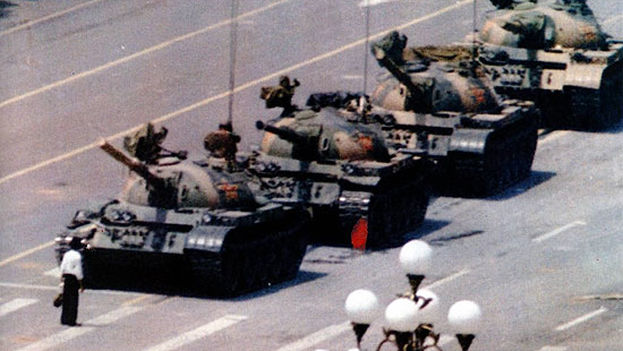
![]() 14ymedio, Yoani Sanchez, Havana, 4 June 2016 – Havana’s Plaza of the Revolution shows its loyalty to its friends in many ways. One of them is complicit silence. When the Tlateloico Massacre happened in 1968, Fidel Castro did not condemn it because his ally, the Institutional Revolutionary Party, ruled Mexico at the time. Something similar happened with the events in Tiananmen Square in China, still absent to this day in Cuba’s official press and discourse.
14ymedio, Yoani Sanchez, Havana, 4 June 2016 – Havana’s Plaza of the Revolution shows its loyalty to its friends in many ways. One of them is complicit silence. When the Tlateloico Massacre happened in 1968, Fidel Castro did not condemn it because his ally, the Institutional Revolutionary Party, ruled Mexico at the time. Something similar happened with the events in Tiananmen Square in China, still absent to this day in Cuba’s official press and discourse.
It has been 27 years since thousands of students demonstrating peacefully in Beijing to demand democratic reforms were forcibly evicted from the square. The turning point of these protests was on June 4, when the army cracked down violently to those gathered at the square, leaving hundreds dead and thousands injured. This coming October, the last known prisoner of those who were arrested during those riots, Miao Deshun, is expected to be released.
Along with the more than one thousand detainees who were sentenced to harsh penalties for showing their desire for change, China sent many other protesters to forced labor camps to be re-educated. Since then, significant resources and millions of hours of propaganda have been dumped on society, to suppress the idea of rebellion and stifle memories.
Recently, several activists who were trying to evoke the date have been detained by the government or prevented from leaving their homes to pay tribute to the victims. The gag-rule extends to virtual space, where China’s internet police have skillfully managed to erase many of the references to the events of Tiananmen Square.
However, despite the fact that in June 1989 the foreign press had been expelled from the area and the government restricted coverage of events, an iconic image was imprinted on the retina of humanity. A defenseless man with a bag, standing in front of a military tank, showed the absolute fragility of citizens under a totalitarian power.
That picture has never been reproduced in any Cuban media managed by the Communist Party. Thus the island’s authorities have joined in the attempt to erase history, vigorously led by their Chinese comrades. They are complicit in the attempt to create a hole in the past.
Today, along with China’s booming economy and environmental problems, there is a country where it is not permitted to speak publicly about its history. A nation that has been offered an unequal economic well-being in exchange for its conscience, but where, also, many have not accepted the deal. They are the ones who remeber that young man who was going to the market when his luck changed forever.
In the case of Cuba, the effort to force amnesia does not begin and end with the tragedy that took place in that vast and distant square. Cuba’s official media once hid from us the fall of the Berlin Wall, denied the Chernobyl accident for weeks, and “made itself scarce” in the face of Nicolae Ceausescu’s crimes.
The loyalty of the Plaza of the Revolution toward its ideological comrades includes the ignoble task of accompanying them in altering the figures, hiding the news, and burying the dead in silence.
